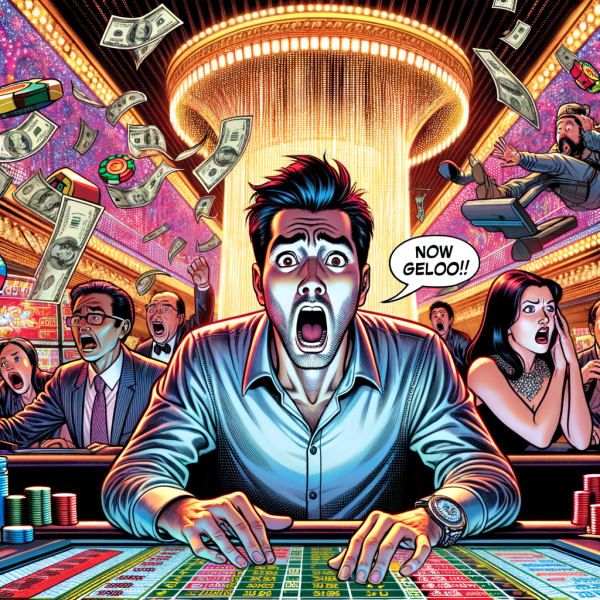The Unexpected Error: A Game-Changing Casino Mistake
In a stunning turn of events, a casino in the heart of Las Vegas made a critical error during a routine game of blackjack, leading to an unprecedented $20 million payout. The incident occurred when a dealer mistakenly miscalculated the value of a player’s hand, allowing the player to win a massive sum that was far beyond the expected payout for such a game. The casino, initially in disbelief, faced the dilemma of honoring the payout or contesting it in court. As the dust settled, the decision to honor the payout became a landmark case in casino operations, shaking the entire industry to its core.
This incident raised a multitude of questions about accountability in gambling establishments. Casinos have strict protocols to ensure fairness and accuracy in their operations, but this incident revealed a critical vulnerability in those systems. With millions of dollars at stake, the ramifications of such mistakes extend far beyond a single transaction; they threaten the integrity of the entire gaming industry. Players and operators alike were left to ponder how one simple error could lead to such a monumental financial obligation.
Moreover, this incident was not merely a one-off mistake; it highlighted systemic issues that could lie beneath the surface of casino operations. Many industry insiders began to recognize that such oversights might not be as isolated as they appeared. The stakes in casino games are high, not just financially for the players but also for the casinos themselves, which operate within a narrow margin of error. The incident serves as a cautionary tale that even established institutions can falter, highlighting the paramount importance of vigilance.
The fallout from this incident also ignited discussions among regulatory bodies about the need for stricter oversight and accountability measures. The casino industry is often seen as a robust and well-regulated environment, yet this event challenged that perception and sparked widespread debate. It became an example of how quickly fortunes could change—in this case, from a routine game to a headline-making financial blunder.
Understanding the Legal Framework Behind Casino Operations
To comprehend the ramifications of this casino mistake, it is essential to understand the legal frameworks that govern casino operations. The gambling industry is heavily regulated to protect both players and operators. Regulatory bodies ensure that games are conducted fairly and that payouts align with expected odds. In this instance, the casino’s error brought attention to the legal obligations that establishments must adhere to, along with the potential liabilities they could face if those obligations are not met.
Each state in the U.S. has specific regulations regarding gaming operations, which include rules on payouts, game integrity, and dispute resolution. Casinos are required to maintain accurate records and adhere to gaming laws that ensure fairness and transparency. The legal implications of failing to meet these standards can be severe, including hefty fines and potential loss of licenses. The $20 million payout challenge presented by the erroneous blackjack game threatened not only the casino’s financial standing but also its operational licenses.
Moreover, the incident revealed a gap in the existing legal frameworks. While regulations focus heavily on payouts and game integrity, they often lack specificity regarding how to handle errors that arise during gameplay. This incident prompted a reevaluation of existing laws and regulations, urging lawmakers to consider establishing more comprehensive guidelines to govern such situations in the future.
As the casino community rallied to address this incident, it became evident that the legal landscape of gambling operations must evolve alongside the industry itself. Stakeholders began discussions on how to incorporate better safeguards and clearer legal definitions regarding operational errors. This incident served as a wake-up call not only for the Las Vegas casino but for the broader industry as well.
The Consequences of Oversights in Gambling Regulations
The $20 million payout had far-reaching consequences for the casino involved, but it also impacted the broader gambling landscape. Oversights in gambling regulations can lead to financial instability, eroded trust among players, and diminished reputations for casinos. This incident, in particular, served as a glaring example of what can happen when regulations fail to protect both players and operators from their own mistakes.
One immediate consequence was the financial strain placed on the casino, which faced pressure to cover the payout while also maintaining its operational expenses. The casino had to reassess its budget, potentially leading to cutbacks in other areas or increased vigilance in its operational protocols. Such financial ramifications can ripple through the entire organization, affecting employee morale and future investments.
Additionally, the incident prompted other casinos to reevaluate their own practices and regulations. The fear of a similar mistake occurring created an environment of heightened scrutiny within the industry. Casinos began to implement stricter training protocols for dealers and introduced more comprehensive oversight mechanisms to catch errors before they escalate. The incident acted as a catalyst for change, highlighting the need for ongoing education and adaptation within the industry.
Trust is paramount in the gambling world, and a single incident can tarnish the reputation of an entire establishment. The Las Vegas casino faced significant backlash from both players and industry analysts, who scrutinized its operational integrity. Over time, however, the casino sought to rebuild its image by enhancing transparency and fostering a culture of accountability, demonstrating that it had learned from its mistakes.
Analyzing the Impact on Players and Casino Reputation
The impact of the casino’s mistake was not limited to the establishment and its finances; players were also affected in profound ways. For those who witnessed the incident, the payout became a symbol of hope and opportunity, while simultaneously raising concerns about the fairness of the game. Players began questioning whether they could rely on the integrity of casino operations, leading to a potential erosion of trust that could have lasting consequences.
In the aftermath of the payout, many players found themselves in a state of confusion regarding the fairness of gaming practices. The incident led to debates about whether the casino should have honored the payout at all, with some arguing that it set a dangerous precedent. The idea that a player could win $20 million due to a dealer’s simple mistake blurred the lines between luck and fairness, prompting players to reconsider their perceptions of risk in gambling.
The casino’s reputation took a significant hit, but it also prompted a renewed focus on player rights. Advocacy groups began to push for more stringent regulations and oversight to protect players in similar situations in the future. The incident served as a rallying point for reform within the industry, as players demanded more transparency and accountability from the casinos they frequented.
Ultimately, the incident became a teaching moment for players and casinos alike. It emphasized the importance of understanding the odds and the potential for errors in any game. This newfound awareness encouraged players to be more vigilant and informed, while also prompting casinos to prioritize integrity and customer trust in their operations.
Lessons Learned: Safeguarding Against Future Errors
As the dust settled from the $20 million payout, the industry began to recognize the importance of implementing lessons learned from this incident. The casino involved took significant steps to ensure that similar errors would not occur in the future. This included revising internal protocols for game management, enhancing dealer training programs, and integrating advanced technology to assist with game calculations.
One of the most crucial lessons learned was the necessity of comprehensive error-checking mechanisms. The casino invested in software that could track game progress and verify payouts in real-time, reducing the likelihood of human error. This technological integration not only improved accuracy but also enhanced customer trust, as players could see that the casino was committed to maintaining fair play.
Additionally, the casino initiated a dialogue with regulatory bodies to advocate for clearer guidelines regarding operational errors. By collaborating with lawmakers, the casino aimed to develop a framework that would protect both players and operators in the event of similar mistakes. This proactive approach demonstrated a commitment to learning from past errors and enhancing the overall integrity of the gambling industry.
The broader industry took note of the lessons learned from this incident as well. Many casinos began to reassess their operational practices, embracing a culture of continuous improvement. The emphasis on training, technology, and regulatory engagement set a new standard for excellence in the gambling arena, ensuring that the mistakes of the past would not be repeated.
The Broader Implications for the Gambling Industry Today
The $20 million payout incident serves as a pivotal moment for the gambling industry, with implications that extend far beyond the Las Vegas casino in question. As the industry continues to grow, the lessons learned from this event underscore the importance of operational integrity, regulatory compliance, and player trust. The incident raised awareness about the need for ongoing vigilance, as even minor oversights can have massive financial and reputational repercussions.
The incident also highlights the evolving landscape of gambling regulations. As technology advances, the expectations for accountability and transparency in casinos will likely increase. Regulatory bodies may be pushed to adapt their approaches to ensure that they are equipped to handle the complexities of modern gambling operations. This could lead to a shift towards more robust oversight mechanisms designed to protect both players and casino operators.
Moreover, the incident ignited discussions on responsible gambling practices. As players become more aware of the potential for errors, they may demand greater protections and safeguards when engaging in gambling activities. The need for clear communication about game rules, odds, and payout structures becomes more critical in building trust and ensuring a fair gaming environment.
Ultimately, the $20 million payout incident serves as a reminder that the gambling industry must remain adaptable and proactive in addressing the challenges it faces. By embracing innovation, enhancing training, and fostering open communication, casinos can work to prevent future mistakes and restore faith in the systems that govern their operations. As the industry evolves, the lessons learned from this incident will continue to shape the future of gambling for years to come.
| Consequence | Description |
|---|---|
| Financial Strain | Immediate financial impact on the casino’s budget. |
| Player Trust | Erosion of trust among players regarding fairness. |
| Training & Protocols | Increased focus on dealer training and operational protocols. |
| Regulatory Reforms | Calls for clearer guidelines and oversight in the industry. |
Q&A Section
Q: What led to the $20 million payout?
A: The payout was a result of a dealer’s miscalculation during a blackjack game, allowing a player to win far beyond the expected amount.
Q: How does this incident affect player trust?
A: The incident raised concerns about the integrity of casino operations, leading players to question the fairness of gaming practices.
Q: What measures are casinos taking to prevent similar mistakes?
A: Casinos are implementing better training for dealers, adopting technology for real-time game tracking, and reassessing their operational protocols.
Q: What are the broader implications for the gambling industry?
A: The incident has sparked discussions about regulatory reforms, responsible gambling practices, and the need for increased accountability within the industry.




